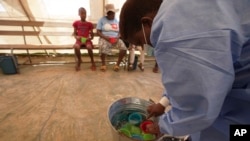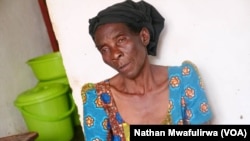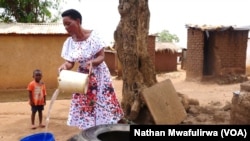However, her son, 31, and daughter, 53, would not survive, along with her brother. Sandram was unable to attend her son's funeral and says the lack of closure left her devastated.
"When someone close to you dies, closure is an important aspect but failing to attend their funerals left me devastated," she told VOA. "I am struggling with four young grandchildren who were left in my care and no social support from the government."
Sandram’s experience is similar to many families' during the height of the cholera outbreak in Malawi. The outbreak infected close to 60,000 people, claiming over 1,700 lives since September last year.
In August, Malawi declared cholera was no longer a public health emergency. Months later, the country has seen a spike in new cases.
With reports of a new cases, Sandram and other community members say they are still grappling with poor sanitation and no access to safe drinking water.
Sandram lives in Area 50, a largely impoverished neighborhood on the outskirts of the nation's capital, Lilongwe.
"We've heard about the new outbreak and are anxious because we still lack access to clean water. We rely on a contaminated well; we can't afford to buy safer alternatives,” Sandram said.
The community uses a water hole located just about 10 meters away from a pit latrine, making conditions ripe for the spread of cholera.
Residents say the only safe alternative, a borehole, broke down several years back.
Adrian Chikumbe, spokesperson for the Malawi’s Health Ministry, described the cholera rebound as "sporadic," saying government is working towards eradicating the disease through door-to-door distribution of chlorine for water treatment in all districts and a campaign on risk communication and community engagement.
The World Health Organization has said that cholera cases in Africa are rising rapidly amid a global surge. The African continent accounted for 21% of cases and 80% of deaths across the globe from 2014 to 2021, according to the WHO.
A number of countries in the southern African region are currently battling with the virulent disease.
Zimbabwe declared a state of emergency in the capital, Harare, over a deadly cholera outbreak.
Cholera is now in country’s 10 administrative provinces, with more than 8,000 suspected cases and over 150 deaths.
Joyleen Nyachuru, a water, sanitation and hygiene officer with the Community Water Alliance non-governmental organization, said she fears a repeat of 2008, when more than 4,000 people died in Zimbabwe's worst cholera outbreak.
"Some don’t even know the signs and symptoms of cholera, so people are just falling sick in their houses without knowing what exactly is happening to them. It’s terrifying," said Nyachuru, who recently delivered a petition to council offices signed by dozens of residents demanding safe drinking water and an end to unhygienic conditions.
Health Minister Douglas Mombeshora said the conditions in Harare were "worrying," after visiting a high-density suburb hardest hit with cholera.
"There is not enough water due to the low pumping capacity at Morton Jeffery water works, with load shedding of electricity also contributing to the low pumping capacity," Mombeshora said. "The boreholes are also contaminated while water conveyance pipes and sewer pipes are very old and leaking. Actually, in some of the houses we visited, sewage was flowing from the rooms."
The minister said the Zimbabwean government had provided $14 million to fight the disease.
Early this year, Tropical Cyclone Freddy exacerbated the cholera situation in Mozambique, with extensive flooding leaving families homeless and reducing clean water access to many communities.
Latest official figures show that as of mid-November, Mozambique had recorded nearly 37,000 cases, with 25,099 people having been hospitalized and 150 confirmed deaths across the country.
South Africa also experienced a cholera outbreak in Gauteng province earlier this year, resulting in over 1,200 suspected cases and 47 deaths.
Adamson Muula, a professor of public health at the Kamuzu University of Health Sciences in Malawi, cited poverty and poor hygiene as the main drivers of the disease in southern Africa, especially where people lack access to clean drinking water.
"Over half of people in Malawi live on less than a dollar each day, and clean water in urban areas is unaffordable when available," he said. "In rural areas where boreholes are the main sources of clean water, we find that many of such boreholes are not functioning."
Muula urged countries in the Southern Africa Development Community, or SADC, to not only prevent flares as they occur but join forces to stop transnational transmission, adding that politicians must do more to engage health experts.
Some information in this report came from the Associated Press.













Forum